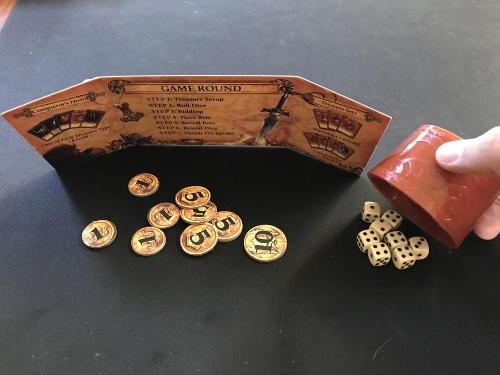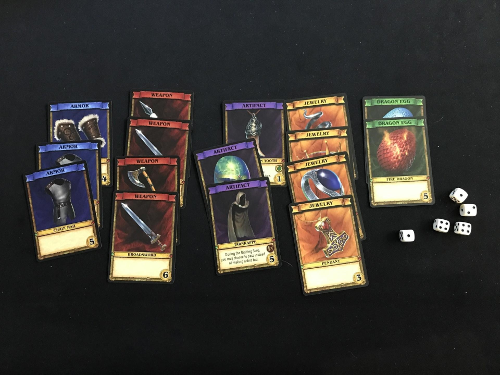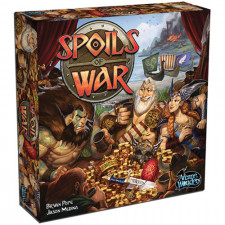Spoils of War Review
on Jun 22, 2017
The first time I played Spoils of War I was fresh off a two-night, eight-hour game of conquering the galaxy and blowing up friends. Not willing to call it an evening, we broke out Spoils of War and found a rollicking game of bidding and bluffing that packed as much side-eye and second guessing each other in 45 minutes as we’d had across two nights of galactic warfare.
Spoils of War’s base mechanic will be familiar to anyone who has played Liar’s Dice. 3-5 players take a handful of dice, shake them up, and secretly peek at what they’ve rolled. From there they begin betting how many dice they can identify across all the dice rolled by all the players. For example, if I look at my dice and see 3 two-pip dice I may bid that there are 6 in the communal pool. The next person can raise that bid by bidding 6 dice of a higher pip-value or more dice of any value.

A bet involving 4-pip dice looks like a pretty good one.
If they decide the bid is already too high, perhaps based on what they’ve seen under their own die rolling cup, they can challenge. Up to this point, Spoils of War doesn’t differ from Liar’s Dice. How it differs is what makes it worth pulling out at game night and why we loved it even in the shadow of an 8-hour space opera. In Liar’s Dice, once the challenge occurs all the dice are revealed. If the bidder finds their dice the challenger loses a die from their personal pool, if not the bidder loses one.
The stakes are different in Spoils of War. For starters, no one loses any dice as there is no player elimination. Additionally, all the other players get to join in on the action. Once the challenge has been made both the challenger and the bidder – known as the declarer – ante in some gold from their Viking stash. Everyone else piles in, placing their own secret bets on who they think is correct. The winning side collects armor, weapons, or powerful artifacts recently plundered on a Viking raid.

Bonuses are earned for items of the same type and for items of all types.
This seemingly simple change elevates an already social game by driving even more interaction above the table. Rather than the outcome of a challenge only affecting two players, everyone is involved in each bid. Table talk erupts like Vikings shouting over a longtable. Goading someone into bidding higher becomes a calculated bluff to bet against them. Cooperation and collusion fill the air, tainted by the suspicion of those same bluffs.
The tension in Liar’s Dice comes from an ever-decreasing pool of dice reducing your information, and an ever-decreasing pool of players making each bid harder to raise. While that’s lost in Spoils of War, it’s replaced by lashing your chance at eternal glory to the currency you need to collect the loot. There’s no X-to-1 conversion for gold and victory points; every coin you lose during bidding is a lost point at the end of the game. There’s a compelling set collection aspect to grabbing loot, to say nothing of artifacts with powerful game-bending abilities, but a solid portion of your points are going to come from your jealously guarded and wagered stash.
Spoils of War is eminently playable. It’s easy to teach and plays quickly, but is tense and compelling from the get go. It’s of a similar weight as Sheriff of Nottingham, another game of bluffing from Arcane Wonders, but it carves its own place on the shelf. Spoils of War is a game of communal chicanery; 9 rounds of lies, information sharing, and deceit punctuated by the reveal of all those dice and the collection of that sweet, sweet loot.

 Customer Support
Customer Support  Subscribe
Subscribe 




 Account
Account  Wishlist
Wishlist 

